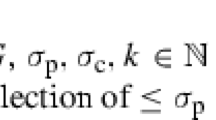Abstract
We describe in this paper an approximation algorithm for the scaffolding problem, which is part of genome inference in bioinformatics. The aim of the problem is to find a maximum weighted collection of disjoint alternating cycles and paths covering a particular graph called scaffold graph. The problem is known to be NP-complete, and we describe further result concerning a special class of graphs aiming to be close to real instances. The described algorithm is the first polynomial-time approximation algorithm designed for this problem on non-complete graphs.
Access this chapter
Tax calculation will be finalised at checkout
Purchases are for personal use only
Similar content being viewed by others
Notes
- 1.
We use here “alternating” in an abusive manner, meaning alternating matching edges and non-matching edges, beginning and ending with non-matching edges.
References
Chateau, A., Giroudeau, R.: Complexity and polynomial-time approximation algorithms around the scaffolding problem. In: Dediu, A.-H., Martín-Vide, C., Truthe, B. (eds.) AlCoB 2014. LNCS, vol. 8542, pp. 47–58. Springer, Cham (2014). https://doi.org/10.1007/978-3-319-07953-0_4
Chateau, A., Giroudeau, R.: A complexity and approximation framework for the maximization scaffolding problem. Theor. Comput. Sci. 595, 92–106 (2015)
Chen, Z., Harada, Y., Machida, E., Guo, F., Wang, L.: Better approximation algorithms for scaffolding problems. In: Zhu, D., Bereg, S. (eds.) FAW 2016. LNCS, pp. 17–28. Springer, Cham (2016). https://doi.org/10.1007/978-3-319-39817-4_3
Dallard, C., Weller, M., Chateau, A., Giroudeau, R.: Instance guaranteed ratio on greedy heuristic for genome scaffolding. In: Chan, T.-H.H., Li, M., Wang, L. (eds.) COCOA 2016. LNCS, vol. 10043, pp. 294–308. Springer, Cham (2016). https://doi.org/10.1007/978-3-319-48749-6_22
Mandric, I., Lindsay, J., Măndoiu, I.I., Zelikovsky, A.: Scaffolding algorithms (chap. 5). In: Măndoiu, I., Zelikovsky, A. (eds.) Computational Methods for Next Generation Sequencing Data Analysis. Wiley, Hoboken (2016)
Mardis, E.R.: DNA sequencing technologies: 2006–2016. Nat. Protoc. 12(2), 213–218 (2017)
Miller, J.R., et al.: Hybrid assembly with long and short reads improves discovery of gene family expansions. BMC Genomics 18(1), 541 (2017)
Weller, M., Chateau, A., Dallard, C., Giroudeau, R.: Scaffolding problems revisited: complexity, approximation and fixed parameter tractable algorithms, and some special cases. Algorithmica 80(6), 1771–1803 (2018). https://doi.org/10.1007/s00453-018-0405-x
Weller, M., Chateau, A., Giroudeau, R.: Exact approaches for scaffolding. BMC Bioinform. 16(Suppl. 14), S2 (2015)
Weller, M., Chateau, A., Giroudeau, R.: On the complexity of scaffolding problems: from cliques to sparse graphs. In: Lu, Z., Kim, D., Wu, W., Li, W., Du, D.-Z. (eds.) COCOA 2015. LNCS, vol. 9486, pp. 409–423. Springer, Cham (2015). https://doi.org/10.1007/978-3-319-26626-8_30
Author information
Authors and Affiliations
Corresponding author
Editor information
Editors and Affiliations
A Appendix
A Appendix
1.1 A.1 Algorithms



Rights and permissions
Copyright information
© 2019 Springer Nature Switzerland AG
About this paper
Cite this paper
Davot, T., Chateau, A., Giroudeau, R., Weller, M. (2019). New Polynomial-Time Algorithm Around the Scaffolding Problem. In: Holmes, I., Martín-Vide, C., Vega-Rodríguez, M. (eds) Algorithms for Computational Biology. AlCoB 2019. Lecture Notes in Computer Science(), vol 11488. Springer, Cham. https://doi.org/10.1007/978-3-030-18174-1_2
Download citation
DOI: https://doi.org/10.1007/978-3-030-18174-1_2
Published:
Publisher Name: Springer, Cham
Print ISBN: 978-3-030-18173-4
Online ISBN: 978-3-030-18174-1
eBook Packages: Computer ScienceComputer Science (R0)




